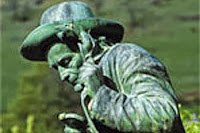Describing an often overlooked characteristic of 19th-century biologists, Joseph Kastner writes:
"Naturalists who never laid eyes on each other became intimate friends by virtue of the long and faithful letters they wrote to each other, year in and year out...." Early British biologists' use of correspondence for research accelerated after the 1840 creation of the Penny Post within England, which set a fixed rate for a letter regardless of the distance it had to travel. No biologist took greater advantage of the postal service for gathering scientific data than Charles Darwin, who penned over 14,000 letters. But there is more than science in those early biologists' letters. There are also matters of the heart.
 |
from Hooker's
Himalayan Journals |
Appreciating the poignancy of some letters requires knowing about the state of 19th-century medicine. Because there were virtually no vaccinations nor oral or injected antibiotics, a child was twenty-five times more likely to die before reaching early adolescence than is a child in Britain today. Despite 19th-century biologists' accelerating knowledge about the natural world, they were not exempt from that statistic.
After the death of Darwin's beloved daughter Annie at the age of ten, the botanist Joseph Hooker, who helped Darwin study plant species, offered his condolences to Darwin. Several years later, only an hour after Hooker's daughter died, Hooker was writing to Darwin to tell of his own grief. Darwin wrote back at once.
 |
Thomas Henry Huxley
|
The leading British advocate for Darwin's theory of evolution for natural selection, Thomas Henry Huxley, also lost a child. After Huxley's son Noel died at the age of three, Darwin drew upon his own experience of grief with Annie to reassure Huxley that grief could soften with time, writing,
"I was indeed grieved to receive your news this morning.... I know well how intolerable is the bitterness of such grief. Yet believe me, that time, and time alone, acts wonderfully.... I cannot think of one child without tears rising in my eyes; but the grief is become tenderer and I can even call up the smile of our lost darling...."
 |
statue of
Jean Henri Fabre |
Such personal expressions of grief and condolence, sometimes traveling in envelopes as part of scientific study, also crossed the English Channel. The most difficult of emotions were sometimes even revealed in the pages of scientific books. The eminent French entomologist Jean Henri Fabre closed his first volume on insects with a dedication to the memory of his own son, who had died when Fabre was working on the book. Charles Darwin, despite scientific disagreements, wrote a cordial letter to Fabre, saying,
"Permit me to add, that when I read the last sentence in your book, I sympathised deeply with you."
I am struck by the tenderness and cordiality of these condolences mingled among the scientific facts. I cannot begin to comprehend all the research of these early naturalists. But I can hope that some of my emails and "snail-mail" notes might express a similar warmth.
~~~
How do you think we today might make our correspondence spiritually supportive?
(The Kastner quote is from A Species of Eternity by Joseph Kastner, © 1977,
and is taken from The Naturalist's Path by Cathy Johnson, © 1991. p. ix.)
(The Darwin quotes are taken from Annie's Box by Randal Keynes, © 2001. pp. 221 & 285.)



3 comments:
Your question about how we might make our correspondence spiritually supportive is so timely! Especially when there is so much ugliness on Facebook and Twitter. Let us all take a deep breath and think twice before pushing those "Send" and "Post" buttons. Do we really want to vent some anger in that way? Or could that email maybe be re-worded so as to be more constructive? Let us all think about it and work to change our habits.
I still enjoy writing letters and save those sent to me. Although over the long term this becomes quite heavy - I currently have three small suitcases filled with selected correspondence and I am only 35 - I think it is worth it. Reading notes from friends and family who have passed away is a golden experience. I find that emails fall short.
As a friend in my church says, we can ask each other "How is spirit moving in your life today?"
Post a Comment